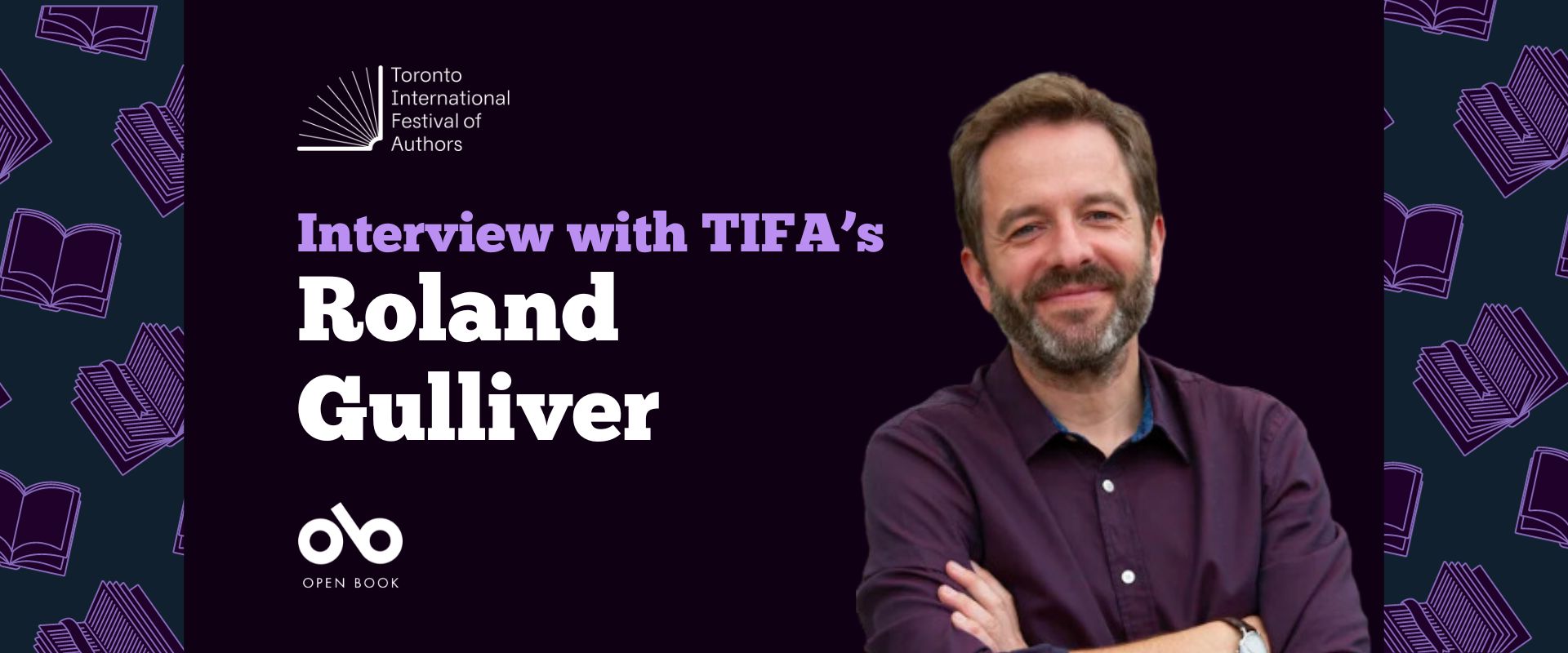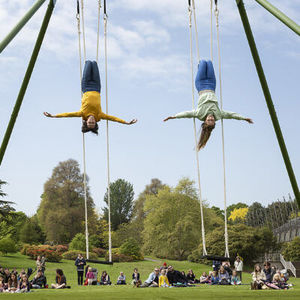TIFA's Roland Gulliver on Genre Evolution, Programming Pair-Ups, & Some Really Big Swings
The Toronto International Festival of Authors kicks off this year on September 21, with a packed calendar of author talks, readings, workshops, and more at Toronto's Harbourfront Centre. Featuring acclaimed storytellers like Emma Donoghue, Michelle Good, Margaret Atwood, and Sarah Polley, it's an 11-day literary whirlwind.
We spoke to the person at the centre of it all, Director Rolland Gulliver, about what it takes to pull off a festival of this scale, from the fascinating process of deciding which writers will pair together well for a discussion to weaving in outside-the-box programming like The Swings installation, a gigantic swing set that encourages book lovers to embrace their playful side.
Gulliver, who previously served as Associate Director at the Edinburgh International Book Festival, tells us about the desire to create something "unexpected but accessible", how genre evolution and hybrid forms have created a "stylistically exciting" time for readers, and the fascinating process of thinking about how two writers' work will intersect in discussion.
Open Book:
TIFA and festival life in general seems to have come back in full swing following the lockdown and pivot to virtual events. As in-person audiences thrive again, do you feel anything has changed about what book lovers are looking for now?
Rolland Gulliver:
I think readers' appetites are broadening and diversifying. Readers are more comfortable now to move between genres in their pursuit of engaging and exciting stories. This began with the birth of e-readers but most recently with social media and BookTok, there’s more openness to explore. And in Canada we can see that across different genres from romance with authors like Farah Heron and Uzma Jalaluddin, horror with Jessica Johns and Adriana Chartrand, historical fiction with Janika Oza and Amanda Peters, and fantastical speculative fiction with Anuja Varghese, Paola Ferrante, and Corina Chong.
OB:
Can you tell us a little about The Swings installation and why it’s something you’re excited about for TIFA guests this year?
RG:
The Swings will be a focus for this year’s Festival, inspiring our Festival theme of Taking Flight and offering us the opportunity explore play, creativity; and as a jumping off point to the flights of imagination reading offers us. Situated outdoors, during the weekends there will be a series of performances of aerial dance theatre followed by an opportunity for audiences to have a go on the 5-metre high swing set.
We wanted to create something playful and fun, something eyecatching for passersby, something unexpected but accessible to encourage people to explore the Festival.
It highlights storytelling in all its forms and encourages people to tell their own stories. We are working with JAYU to capture and document people’s participation. Swings and playparks are something we all relate to, somewhere we began to explore freedom, take risks, build our own communities.
OB:
One of the most interesting things about TIFA conversations is seeing how the events are curated and which authors are paired together. How do you and your programming team approach finding the right combination of writers to make an event dynamic?
Your CanLit News
Subscribe to Open Book’s newsletter to get local book events, literary content, writing tips, and more in your inbox
RG:
Bringing authors together on stage is one of my favourite elements of programme making, creatively exciting, and a way to offer both authors and audiences the opportunity to experience conversations they wouldn’t find anywhere else. Importantly, it offers ways for international authors to connect with local audiences and Canadian authors the opportunity to connect with their international counterparts.
There are various elements we look for: similar themes, styles, and aesthetics to their work as well as a the general sensibility of the writer in approaching their work. Sometimes, it can just be gut instinct, a feeling that two writers could have a fascinating conversation if we were able to bring them together. A bit like knowing a book you’ve read would really work for someone you know.
This year we have some wonderful examples including:
Carlos Fonseca and Karmele Jaio (3:30pm, Saturday September 23), Bachtyar Ali and Jamaluddin Aram (1:00pm, Sunday September 24), Adriana Chartrand and Marie Hélène Poitras (8:00pm, Tuesday September 26), Kevin Chen and Catherine Hernandez (6:00pm, Thursday September 28), Leila Aboulela & V.V Guneshananthan (12:30pm, Saturday, September 30), and Paul Harding & Kai Thomas (3:00pm, Sunday October 1).
OB:
In recent years, narrative nonfiction including memoir and personal essays have been particularly popular with readers and audiences. Have you seen this reflected at TIFA, and if so, why do you think those genres are enjoying increased interest?
RG:
I think this is definitely the case. For a number of reasons the memoir has moved beyond the ‘celebrity’. It has been a vital journey for Canadian literature in recent years where the explosion of incredible memoirs from authors who are Indigenous, Black, or People of Colour. This has enabled their voices to be heard and to begin to redefine the mainstream. Overall people want to understand personal experience, we read others to find ourselves, and people have become empowered to tell their stories whether in books or through social media. Also, the barriers between forms and genres so memoir and essays have become more stylistically exciting, with hybrid forms and genres influencing the storytelling. This could apply to spoken word and poetry with artists like Britta B to writers like Omer Aziz, Kyo Maclear, Kwame Alexander, and others.
OB:
While it must be difficult to choose, but can you tell us about one or two events you’re especially excited about in this year’s festival?
RG:
It is always difficult to choose highlights from the programme. From a Canadian perspective, there are authors who I am excited to meet, authors I have admired from afar and who when I became Director I was excited to working with budget the pandemic delayed that in-person connection: Vincent Lam, Patrick deWitt, Charlotte Gray, Emma Donoghue, Michelle Good, Sean Michaels.
_______________________________________________________
The Toronto International Festival of Authors (TIFA) inspires and connects through the art of stories, offering book lovers a breadth of bold, ambitious and accessible literary experiences. As Canada’s largest literary festival, the charitable organization provides engaging opportunities to meet, hear and learn from the world’s best authors and artists across the range of literary genres, and to celebrate the power of stories.
For over 40 years, TIFA has presented an annual 11-day festival celebration, bringing together readers and writers from all over the globe to Harbourfront Centre every fall, to explore and celebrate the joy of stories. TIFA also offers year-round events, activities and mini-festivals.




